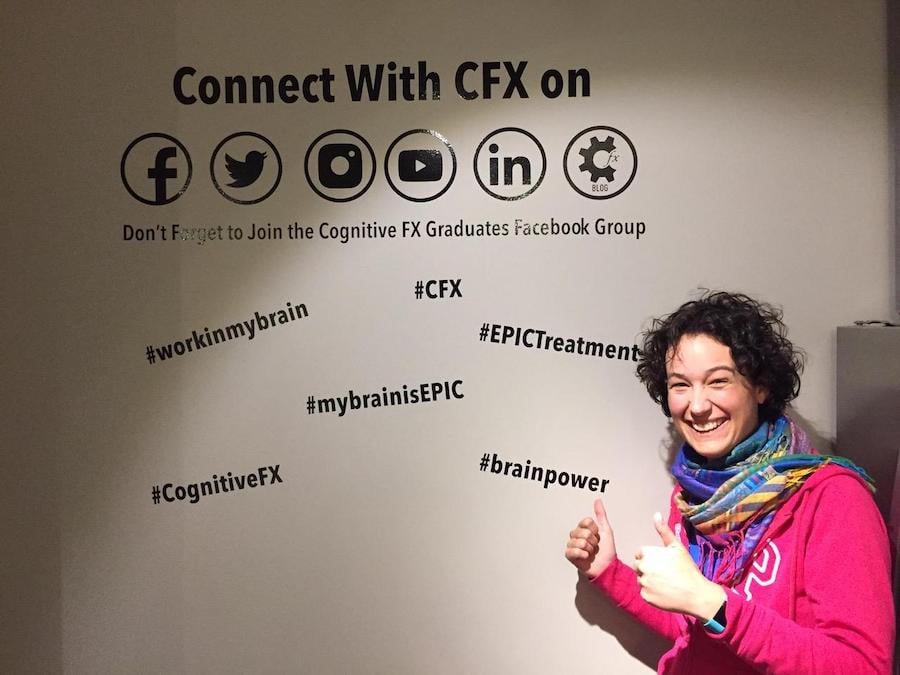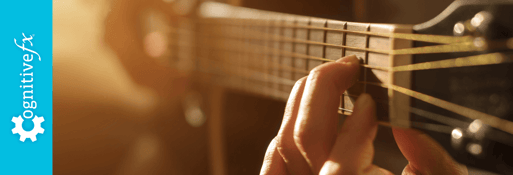In her youth, Myrthe van Boon loved playing sports and being outside. On breaks from school, she loved going sailing or teaching others how to sail. Her favorite holiday destination was going to the mountains to hit the slopes. But that life disappeared in an instant when she fell during a skiing trip at age 22.
 Myrthe mainly snowboarded but chose to ski instead the week of her accident.
Myrthe mainly snowboarded but chose to ski instead the week of her accident.
On her way down the slope, she hit something under the snow and slammed forward, crashing head first into the ground. Immediately, she knew something was wrong. By the time she reached the bottom of the slopes, she was having trouble walking without support from her then boyfriend.
Over the next thirteen years, she went on to suffer relentless — and scary — symptoms. Her fluent English disappeared. She couldn’t stand sounds and lights. Her pain and exhaustion kept her bedridden many days. And most of the doctors she visited either said they couldn’t help or that she was making up her story.
One neurologist she visited had the gall to say, “You just like to be taken care of,” and said Myrthe would get better when she decided to get better.
“If they don't know the answer, if they say it's your fault — then you know they're wrong, but it still gets to you,” Myrthe shared. “Doctors don't understand what the influence is of what they are saying to you. They say such harsh things. And then you are doubting yourself all the time, thinking, ‘Am I am wrong?’ It's really difficult.”
But Myrthe didn’t let her condition stop her from living her life. She finished her Psychology degree over time, got married (to the man who helped her walk after her accident), and even had two daughters. “We had the life we wanted, only differently. We were always looking at what was possible instead of what was not possible. It was still very hard, but at least we had some feeling that we had control over our lives,” she said.
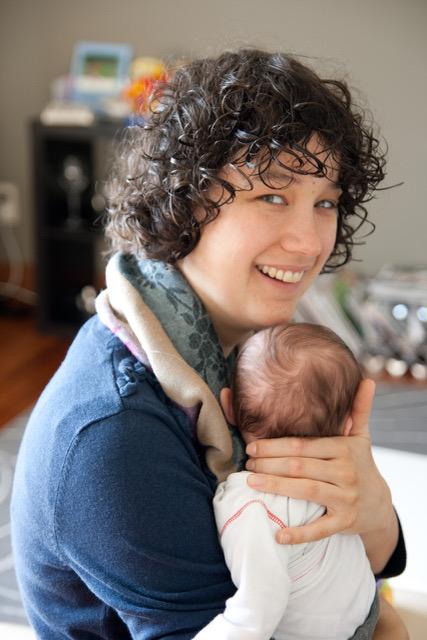 Myrthe with her baby daughter. Despite the obstacles, she graduated, married, and had two children.
Myrthe with her baby daughter. Despite the obstacles, she graduated, married, and had two children.
That willingness to work within her limitations to find happiness carried her through a terrible situation. And once she did find a way to recover from her condition, that determination carried her through treatment at Cognitive FX.
In our conversation, Myrthe shared:
- The scary after-effects of her concussion from skiing
- What it was like to suffer from concussion-induced chronic illness
- How she made a nearly 90% recovery at our post-concussion treatment center
- Her gratitude for the life she has now with her husband and daughters.
If you’re experiencing symptoms that won’t resolve after a concussion, you’re not alone. And you’re not crazy. On average, our patients improve by 75% after treatment at our center specializing in post-concussion therapy. To see if you are eligible for treatment, sign up for a consultation.
Note: Any data relating to brain function mentioned in this post is from our first generation fNCI scans. Gen 1 scans compared activation in various regions of the brain with a control database of healthy brains. Our clinic is now rolling out second-generation fNCI which looks both at the activation of individual brain regions and at the connections between brain regions. Results are interpreted and reported differently for Gen 2 than for Gen 1; reports will not look the same if you come into the clinic for treatment.
‘Feeling Like I Lost Myself’: The Scary Effects of Myrthe’s Skiing Concussion
Like most concussion patients, Myrthe was told immediately after her accident that she would be completely fine after two weeks of bed rest. But as the weeks drew on, the promised recovery didn’t come, and she realized it may never come from just resting. And in the meantime, her symptoms were frightening.
Myrthe’s concussion damaged many parts of her brain, including areas that controlled balance, decision making, and memory. In the beginning, her headaches were so bad that she didn’t notice the cognitive changes that occurred after her injury. She had dizzy spells and couldn’t walk around the house without help. Sunlight was intolerable. She couldn’t stand the buzzing from electronics.
But she did improve some, and the headaches got better. So she decided to return to school several weeks after the accident. That’s when reality set in.
Born and raised in Holland, Myrthe could navigate public transport with ease before her concussion. “I got lost in the train station and didn’t know how,” she said. Normal things that used to be easy were now impossible. One time, she managed to bike to her university, only to find that she couldn’t do or think anything anymore. She had to call her boyfriend because she had no idea how to get home.
And when she went on a small trip to Tunisia, she realized — to her horror — that she couldn’t communicate. Once a fluent English speaker, all she could remember were the words, “Hello” and “Goodbye.”
“You just get more insecure every time something happens like that because you just don't understand what's happening. I remember one time, I went to the kitchen to make breakfast for myself. The glass bowl fell and sent glass and cereal everywhere.
It was so strange. I looked at myself, but I really could not clean it up. I just walked out of the kitchen, I cried, and I could not enter the kitchen for the whole day because I could not deal with the mess that was there.
You see yourself doing that and you think, ‘This is totally crazy. How is this happening? Why am I not cleaning it up?’ And those are the scariest things, that you look at yourself and you really don't understand who you are anymore. ‘This is not me anymore.’ It was terrifying, feeling like I lost myself.”
Coping & Seeking Answers: How Myrthe Found a Solution
Throughout the years, Myrthe went through cycles of trying doctors and therapies and resting from the failed attempts. In Holland, she said, all the doctors she saw were either unhelpful or dismissive.
But when she went to Belgium, her new doctors found a medication to control her chronic pain and another one for her dizziness. “After that, I had a much better quality of life. I was so grateful for a different country with different doctors who took it seriously,” she said.
To cope with being unable to play sports, Myrthe took up photography. “I took a lot of pictures and that really helped, because sometimes if you cannot be part of the moment but you are behind the camera, you can be part of it still,” she explained.
Eventually, her family moved to the Middle East so they could afford a nanny to care for the children and because the heat helped with Myrthe’s pain. After that, she only needed medicine for her dizziness.
 Myrthe’s husband and two daughters on a hike. She loves to act as the family photographer.
Myrthe’s husband and two daughters on a hike. She loves to act as the family photographer.
Myrthe learned to make choices about how to spend her energy on the good days. “Being two weeks in bed was worth being with friends for a weekend. You’re two weeks in bed, but at least you have seen your friends,” she said. She loved opportunities to travel, see friends, and be with family, despite the consequences afterward.
“[Chronic illness] is always very difficult because people don't see how it is. They see you when you do your best to be part of something, and they don’t see how much effort it costs. So most people never understand how difficult life was for me,” she said.
As it turned out, attending a social gathering was how she found a solution to her condition. At a friend’s wedding, she was reunited with someone whose colleague’s sister (Alies Kool) received treatment for symptoms just like Myrthe’s. The friend sent her a link to a blog post about Alies’ recovery story.
When she got home, Myrthe read the post. “I read it and I thought, ‘I just read my story, but this one has a happy end. How? How is this possible?’”
The blog post she read talked about a concussion treatment clinic in Provo, Utah, called Cognitive FX. Post-concussion patients go to Cognitive FX for custom-tailored cognitive and physical exercises to repair the damaged pathways in their brain. Utah was a long way from home for Myrthe and her family. But she and her husband agreed they’d always regret not going.
The Week That Changed Everything
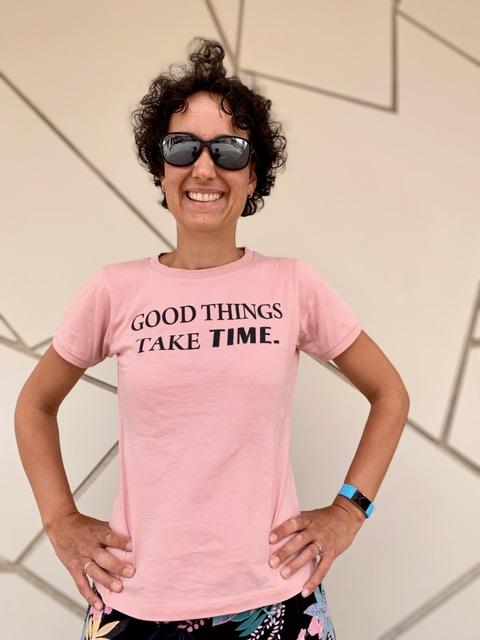 Myrthe’s patience and persistence paid off during and after treatment.
Myrthe’s patience and persistence paid off during and after treatment.
It’s hard to overstate the difference between the Myrthe who got on a plane to the U.S. and the Myrthe who returned home.
Before leaving for Utah, she had to buy exercise clothes because she didn’t own any after 13 years of no physical activity. This from the woman who used to live for the outdoors. “It felt really strange to be buying them. I thought, why would I use these?” she remembered.
But when she walked into the clinic, she was determined to do whatever it took to get better. “My husband and I said to each other, ‘We will give the full 200%. You will never say no. Whatever they say, you will do it,” she said. The first thing she did was get an fNCI scan, which would show which regions of her brain were impaired.
“I was so anxious before I went because I had the feeling there would be nothing from the scan. That they would say again, ‘Sorry, we cannot find anything.’ But all the problems that I experienced were in the scan. So that was an emotional moment. After all those years, to think, ‘Wow, it is in my brain, and the things that I thought were wrong are,” she said.
Below are the overall scores she received after her scan. On the left is her score before treatment (in the red zone), showing significant problems. On the right is her score after treatment, which shows her remarkable progress!
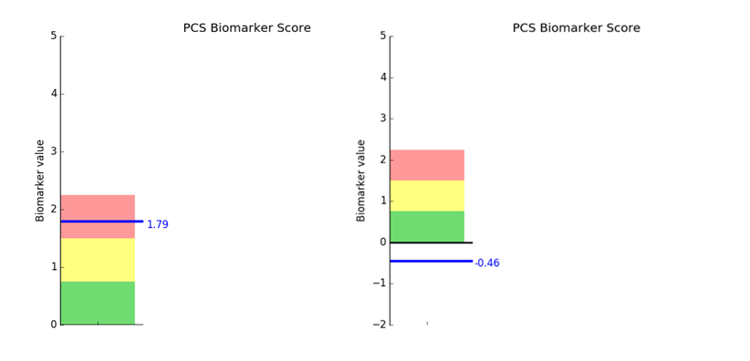
And Myrthe certainly took her treatment seriously. She worked hard on memory exercises, balancing exercises, visual exercises, occupational therapy, speech therapy, and everything in between. Just a few days in, she was able to play with her girls after treatment was over. "Halfway through the week, I went outside during my lunch break and the world looked totally different — brighter and clearer. My head was calm for the first time ever in all those years. It was an amazing and emotional moment. It gave me faith that this was going to work and would make a difference."
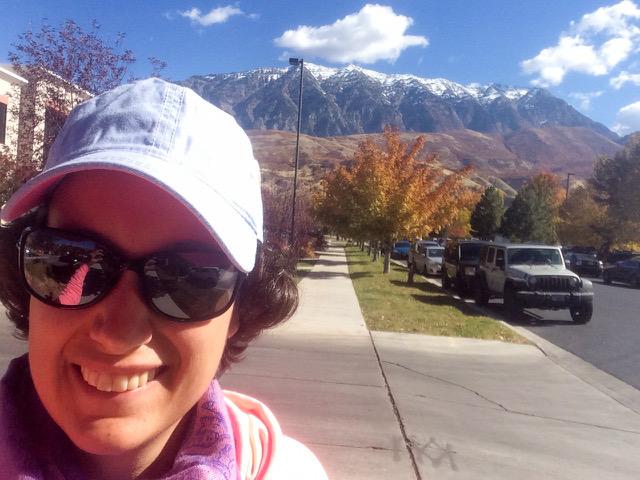 Myrthe on a lunch break during treatment. She realized the world looked brighter and clearer.
Myrthe on a lunch break during treatment. She realized the world looked brighter and clearer.
The Saturday after she finished treatment, her family went for a walk to a waterfall in the morning, and then she and her husband went to a football game. “That was amazing,” she said. “It was a crowded stadium with fireworks and lots of noise and I enjoyed it!” After that, they went out to eat and even went shopping later. It was already a huge change: Previously, even one activity in the day could overwhelm her. But that day, she could handle four — a level of activity she’s consistently able to achieve when needed.
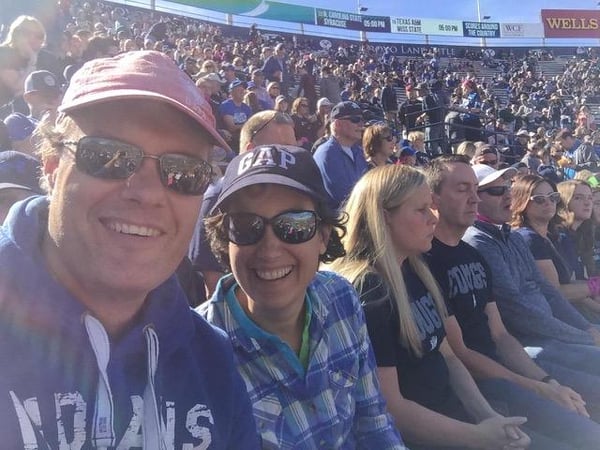 Myrthe and her husband enjoying a football game after her treatment concluded.
Myrthe and her husband enjoying a football game after her treatment concluded.
She visited Cognitive FX in October 2018. Six months later, she’s still building up her physical strength and returning to “normal” life. But her cognitive ability returned right away. And while she had regained her English (from using it so much while living abroad), she’s found that it’s much easier to speak it, even when she’s tired.
Being a Mom Again
One day, Myrthe may consider joining the workforce. But for now, she’s overjoyed at the chance to be present in her children’s lives.
“I did the treatment to be the mom I always wanted to be,” she said. She enjoys the simple moments with them so much. Before treatment, if her girls turned on loud music, she would ask them to turn it off. Now, she gets up and dances with them.
She can play with her two-year-old daughter. She can bake cookies with her seven-year-old. And she can make breakfast and take care of them when they need her. She can snuggle up on the couch and watch movies. She can even play tennis and go swimming with her family. “The happiness of life is in all those little things that you can do,” she said. “For me, that’s the most important.”
But the big moments in life are better now, too. “We just went on holiday last week, and I enjoyed it so much!” she said. “When we traveled before, there was always that layer of ‘survival mode.’ Now I could really enjoy it. Just sit, relax, and enjoy the kids. Enjoy the moment. It's just amazing.”
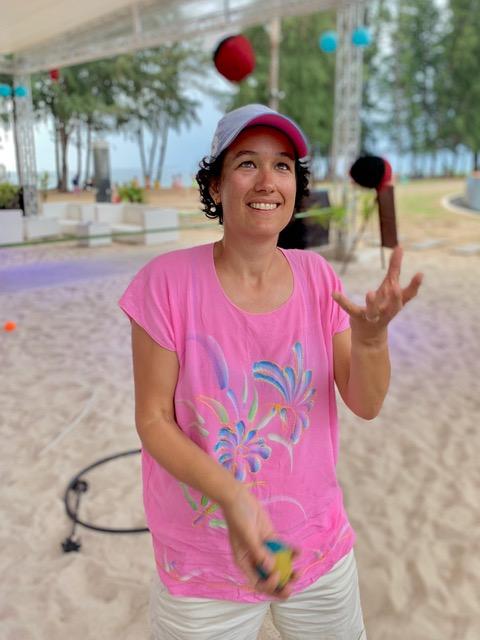
Myrthe doing some “brain training” while on vacation.
One of the biggest improvements she’s noticed is how much energy she has. Previously, she couldn’t function without a daily nap (something she no longer needs), and she was exhausted all the time. Now, she feels great and exercises 3-4 times a week — putting those exercise clothes to good use. She went from three pills a day for dizziness to no medication needed. Her headaches are better, though they do return from time to time. The world looks clearer, and tasks like organizing and planning are a breeze.
Myrthe doesn’t know if she will make a complete recovery, but says that it’s not important. She is simply thrilled with her progress. “I think the improvement is more than 80%. I could never have dreamed that I could have had this life again. For me, it's worth everything. Every day, I’m so grateful that we did this.”
Note: If you’re experiencing symptoms that won’t resolve after a concussion, you’re not alone. And you’re not crazy. On average, our patients improve by 75% after treatment at our center specializing in post-concussion therapy. To see if you are eligible for treatment, schedule a consultation.
